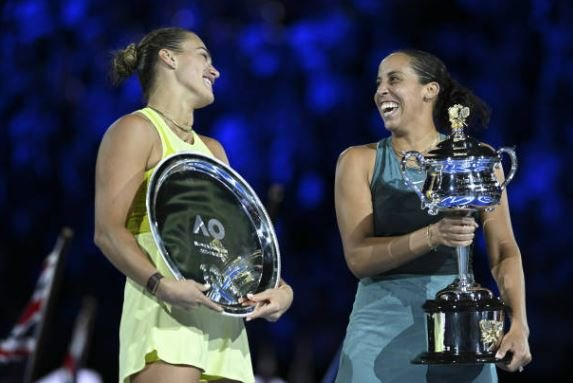In one of the most popular results in recent memory, American, Madison Keys has finally reached the pinnacle, winning her first Grand Slam title.
The 29-year-old triumphed in a 3-set classic over 2-time champion, Aryna Sabalenka, 6-3 2-6 7-5.
Both players opened up honestly in their post-match press conferences.
Here’s some of what the competitors had to say.
The Runner-Up:
Aryna Sabalenka admitted there wasn’t much more she could do to take co trip of the match.
“Well, I think she played, like, super aggressive. It seemed like everything was going her way. I was just trying to put the ball back. Couldn’t really play my aggressive tennis and didn’t feel my serve that well. The return was off.
Then in the second set I kind of got my rhythm back. From the second set, I would say the real tennis match started.”
The After-Match Emotions
At the conclusion of the match, Sabalenka let her emotions out, smashing a racket, visibly crying in her towel, before leaving the court to compose herself.
She explained what was going through her head in those moments.
“Well, I mean, there definitely was a bit of frustration because I was so close to achieve something crazy. When you’re out there, you’re fighting, but it seems like everything going not the way you really want to go.
I just needed to throw those negative emotions at the end just so I could give a speech, not stand there being disrespectful. I was just trying to let it go and be a good person, be respectful .
I was standing there and just was like, ‘Okay, c’mon, you’ve been in her position. She deserve that. She was better player than you.’ It was tough.”
Talking about Keys’ level, Sabalenka was quick to praise her, and admit she could get even higher up the rankings (Keys will be ranked 7 when the new rankings are released).
“I mean, if she can play consistently like that, I mean, it’s not much you can do. I mean, of course, I know how to play against her, but in this match I couldn’t really do my stuff.
She just played incredible. It seems like she was overhitting everything. The depths of the balls were really crazy. I was trying my best. Obviously didn’t work well.”
As I said, if she can continue playing the way she was playing today, yeah, she can be one of the — she can be in top 5.”
The Champion:
For the champion, Madison Keys, it was impossible to wipe the smile off her face.
“I’m mostly just really proud of myself to get back to this position and be able to play the way that I played and finish on such a strong note. I’m just really proud of myself.
I didn’t always believe that I could get back to this point. But to be able to do it and win, it means the world to me.”
Keys had been touted as a Grand Slam winner from the age of 11 or 12, and admitted it was letting go of that pressure that has ultimately helped her to reach this dream of a Major win.
“I felt like from a pretty young age, if I never won a Grand Slam, then I wouldn’t have lived up to what people thought I should have been. That was a pretty heavy burden to kind of carry around.
I finally got to the point where I was proud of myself and proud of my career, with or without a Grand Slam. I finally got to the point where I was okay if it didn’t happen. I didn’t need it to feel like I had a good career or that I deserved to be talked about as a great tennis player.”
I mean, it (the Grand Slam predictions) definitely started pretty young. Probably 11, 12, something like that. It obviously was meant to be confidence-building and all of that.
I think as I got older and I had gotten close and it didn’t happen, and then it’s you’re getting older, you’re obviously in the later stages of your career, it kind of feels like, Will this ever actually happen? If it doesn’t happen, I didn’t live up to what everyone told me I should have done.”
Keys had been upfront in how she would tackle the match-up, and her plan was executed to absolute perfection.
“I just kept telling myself, ‘Be brave, go for it, just kind of lay it all out on the line’. Kind of at that point, no matter what happens, if I do that, then I can be proud of myself. It just made it a little bit easier.”
Therapy Was the Key to Unlocking Success.
With all the pressure on Keys from both the outside, and within herself, she has found it hard to let go of all that, and focus on being happy. In a reflective and honest moment, Keys opened up when asked if there was something specific that helped her.
“Lots of therapy. I really kind of bought into it. I think in the past I had always kind of tried to go the sports therapy route where it was more about routine and controlling things you can control and all of that.
I felt like I was always good enough at that, but to really start kind of digging in on how I felt about myself and really being honest with myself about it, it was really hard because I didn’t really want to be the person that felt like I was really struggling, but I was starting to really struggle with it.
So just being really honest and actually getting help and actually talking to someone, and not just about tennis but about how I felt about myself. Again, very uncomfortable. I never really like to be uncomfortable.
I honestly think that had I not done that, then I wouldn’t be sitting here.”
Overcoming Nerves
Part of that therapy was also learning to deal with nerves that can cripple athletes at times.
“I think for a long time in my head I had this idea that people were able to kind of just ignore their nerves or doubts or anything like that and just kind of tunnel vision play tennis.
In the past, if I ever had nerves come up or something, I typically would not play as well. So it started getting to the point where when nerves came up, I was thinking, Oh, no, now I’m going to play badly. It would almost kind of start this internal panic.
For whatever reason, it was kind of just like this light bulb moment where I started really buying into, I can be nervous and I can still play good tennis. Like, those things can live together.
So I stopped fighting trying to push away the feelings and pretending that they’re not there and just accepting them and really telling myself that they’re fine and they’re totally normal to be there, and I can still play tennis.
I think doing that day in and day out and just kind of accepting that it’s going to be uncomfortable, you’re going to be nervous, there’s going to be thousands of people watching you, but you can still do it, and then starting to actually be able to do that just kind of started to give me more confidence.”
Something that was different in her mindset on-court, was realising there will be times within matches and tournaments, where things aren’t going 100% right. But that’s ok.
“I think there was a confidence in maybe not playing matches amazingly from start to finish and having some dips here and there, but being able to kind of end on a really high note each time and figure out how to get back in matches or how to close out a match really well.
I just slowly started continuing to build the confidence. I think part of it was that I never really got ahead of myself in each round. I never once thought about the next round until I was actually there.
I believed that I could do it (win the title). I also think I did a good job of just focusing on the task at hand.”
And with that, Madison Keys is no longer one of the best players never to win a Major.
Madison Keys is now a Grand Slam Champion.
Read about what Jannik Sinner and Alexander Zverev had to say after their final.
Follow The Tennis Site on Facebook and X: @thetennissite
Follow Todd Scoullar on X: @toddscoullar


Comments are closed, but trackbacks and pingbacks are open.